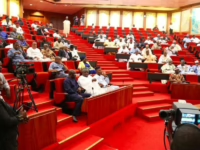The House of Representatives has urged the federal government to prioritize the distribution of 753 confiscated duplexes in Abuja to low- and middle-income earners, internally displaced persons (IDPs), and other marginalized Nigerians. These properties were previously linked to the former Central Bank of Nigeria (CBN) governor, Godwin Emefiele.
This directive emerged from a motion presented by Bauchi State lawmaker Jafaru Leko, which was unanimously approved during Tuesday’s plenary session.
According to reports, the incomplete housing estate situated in the Lokogoma area of the Federal Capital Territory (FCT) was officially handed over in May by Ola Olukoyede, chairman of the Economic and Financial Crimes Commission (EFCC), to Ahmed Dangiwa, the Minister of Housing and Urban Development. This transfer followed a presidential order aimed at completing the estate and making it available for public allocation.
Leko emphasized that the recovered estate offers a significant chance to alleviate Nigeria’s massive housing shortage, which exceeds 17 million units nationwide, especially in urban centers such as Abuja.
“With effective management, this estate could play a vital role in bridging the housing gap in Nigeria’s cities, particularly in Abuja,” he remarked.
However, he cautioned that without a clear, fair, and transparent allocation system, these properties might be monopolized by privileged elites, thereby undermining the government’s anti-corruption objectives.
“If the distribution process lacks transparency and accountability, there is a risk that these recovered assets will be captured by influential individuals, negating the purpose of asset recovery and depriving ordinary citizens of access to decent housing,” Leko warned.
He further highlighted that providing adequate housing is a constitutional duty of all government tiers, as outlined in Chapter II of the 1999 Constitution.
“The absence of an open beneficiary selection mechanism or legislative oversight could diminish public trust in the government’s commitment to anti-corruption and social equity initiatives,” he added.
Following discussions from multiple lawmakers, the motion was passed by voice vote under the leadership of Deputy Speaker Benjamin Kalu.
As a result, the House mandated the Ministry of Housing and Urban Development to develop and publicly release a transparent, inclusive framework for allocating the recovered estate, prioritizing vulnerable groups such as low-income earners and IDPs.
The ministry is also required to submit a detailed report within 60 days, outlining the intended use, allocation criteria, and beneficiary selection procedures for the estate.
Moreover, legislators called on the ministry to create a national registry of forfeited assets to facilitate public monitoring and enable civil society participation, a step expected to enhance accountability and bolster confidence in the government’s anti-corruption efforts.





















